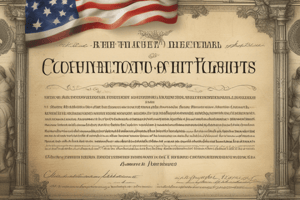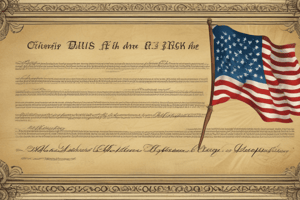Podcast
Questions and Answers
Who drafted the first ten amendments to the U.S. Constitution, known as the Bill of Rights?
Who drafted the first ten amendments to the U.S. Constitution, known as the Bill of Rights?
- Thomas Jefferson
- George Washington
- James Madison (correct)
- Benjamin Franklin
Which of the following is NOT explicitly guaranteed under the Bill of Rights?
Which of the following is NOT explicitly guaranteed under the Bill of Rights?
- Freedom of speech
- Protection from unreasonable searches and seizures
- Right to bear arms
- Right to free healthcare (correct)
What key concern among some states led to the creation of the Bill of Rights?
What key concern among some states led to the creation of the Bill of Rights?
- Establishing a monarchy in the newly formed country
- Expanding the powers of the federal government
- Protecting individual liberties from federal government overreach (correct)
- Ensuring equal pay for all workers
Which amendment guarantees the right to a fair trial and protection from double jeopardy?
Which amendment guarantees the right to a fair trial and protection from double jeopardy?
Which amendment explicitly protects individuals from self-incrimination?
Which amendment explicitly protects individuals from self-incrimination?
Which amendment provides protection against unreasonable searches and seizures?
Which amendment provides protection against unreasonable searches and seizures?
What was a primary concern that led to the inclusion of the First Amendment in the Bill of Rights?
What was a primary concern that led to the inclusion of the First Amendment in the Bill of Rights?
Which amendment clarified the procedures for presidential elections?
Which amendment clarified the procedures for presidential elections?
What important right was granted to women by the Nineteenth Amendment?
What important right was granted to women by the Nineteenth Amendment?
Which amendment abolished slavery in the United States?
Which amendment abolished slavery in the United States?
What was the main purpose of the Fourteenth Amendment?
What was the main purpose of the Fourteenth Amendment?
Which amendment addressed the issue of child labor restrictions?
Which amendment addressed the issue of child labor restrictions?
Study Notes
Understanding the US Constitution's Foundational Documents: Bill of Rights and Amendments
The United States Constitution is a vital pillar of American democracy, serving as a fundamental blueprint that guides our governmental structure and protects the rights and liberties of all citizens. In this brief exploration, we'll delve into two key components of the U.S. Constitution: the Bill of Rights and its subsequent amendments.
The Bill of Rights (Amendments I–X)
Immediately following the signing and ratification of the U.S. Constitution in 1788, a concern emerged among some states regarding their individual liberties being infringed upon by the newly formed federal government. To address these concerns and strengthen protections for civil liberties, James Madison drafted what would become known as the first ten amendments to the Constitution—the Bill of Rights. This collection of amendments ensured that certain provisions, such as freedom of speech, press, religion, assembly, petition, right to bear arms, protection from unreasonable searches and seizures, due process, fair trials, self-incrimination, double jeopardy, jury trial, and property rights, were explicitly guaranteed under law.
Some historical context surrounding specific amendments within the Bill of Rights includes:
- First Amendment: Owing to religious diversity during colonial times, early settlers wished to avoid any state-sanctioned religion; thus, protecting the free exercise of faith became a top priority.
- Second Amendment: During the Revolutionary War, citizens had armed themselves against British rule. As such, this amendment preserves one's right to own firearms while also ensuring the continuance of a well-regulated militia.
- Fourth Amendment: Originating from England's Bill of Rights, this provision safeguards individuals from unwarranted searches and seizures.
Subsequent Amendments
After the adoption of the initial ten amendments forming the Bill of Rights, numerous additional changes have been made throughout history. These revisions serve multiple purposes, including correcting perceived flaws in the original text, reflecting societal shifts, and addressing new challenges facing society. Some critical examples of amendments include:
- Twelfth Amendment (1804): Clarified presidential election procedures, separating electoral votes between president and vice president.
- Thirteenth Amendment (1865): Abolished slavery.
- Fourteenth Amendment (1868): Provided citizenship to African Americans, defined due process, equal protection, and other important constitutional checks.
- Fifteenth Amendment (1870): Enfranchised black men after the Civil War.
- Nineteenth Amendment (1920): Granted women the right to vote.
- Twenty-sixth Amendment (1971): Lowered voting age to 18 years old.
- Others: Examples include prohibition through the Eighteenth Amendment, repealed via the Twenty-first Amendment; restrictions on child labor with the Fourteenth Amendment; expansion of disability rights with the Twenty-sixth Amendment; and others.
Understanding the intricacies and evolution of America’s foundational documents like the U.S. Constitution allows us to appreciate the tremendous impact they have had on shaping the country and its people. By acknowledging the role played by both the Bill of Rights and subsequent amendments, we gain insight into the ongoing effort to create and preserve liberty and justice for all citizens.
Studying That Suits You
Use AI to generate personalized quizzes and flashcards to suit your learning preferences.
Description
Delve into the United States Constitution's critical components: the Bill of Rights and subsequent amendments. Explore the historical context, significance, and impact of provisions safeguarding civil liberties and shaping American democracy.




